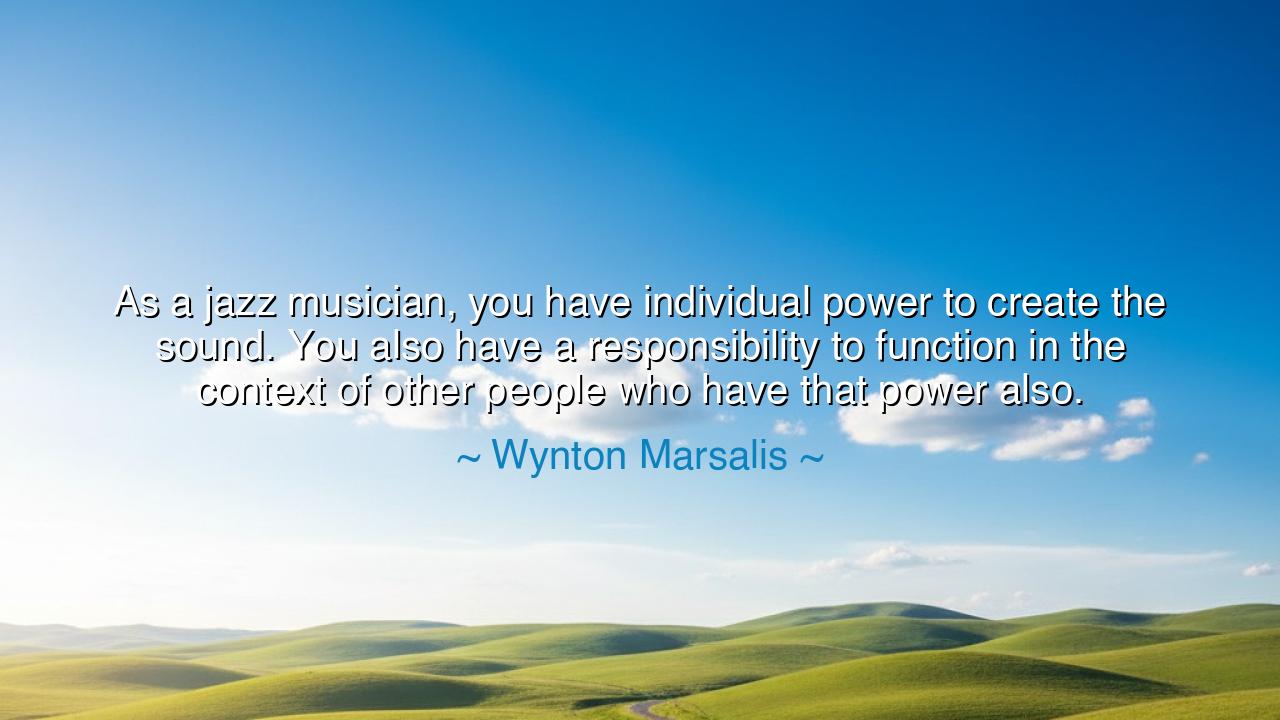
As a jazz musician, you have individual power to create the
As a jazz musician, you have individual power to create the sound. You also have a responsibility to function in the context of other people who have that power also.






The words of Wynton Marsalis—“As a jazz musician, you have individual power to create the sound. You also have a responsibility to function in the context of other people who have that power also.”—are not merely about music, but about the essence of life itself. They speak of the balance between individual power and collective harmony, reminding us that freedom without regard for others becomes chaos, while unity without individuality becomes silence. In jazz, as in life, each soul has a voice, yet that voice must learn to weave itself into the larger tapestry.
This utterance is a hymn to the dual nature of freedom and responsibility. The jazz musician may improvise, shaping notes as the spirit demands, but he must also listen—to the trumpet, the bass, the drum, the piano. For his brilliance is not diminished by restraint; rather, it is magnified when it dances with the brilliance of others. So too must each person in society hold fast to their uniqueness, yet live with awareness that others, too, carry the fire of creation.
History reveals this lesson in the story of Athenian democracy. Each citizen had the power to speak, to shape laws, to guide the destiny of the city. Yet this freedom carried the responsibility to honor the voices of others, lest liberty collapse into tyranny. Just as jazz thrives when each musician honors the ensemble, Athens endured when its citizens balanced personal power with civic duty. Marsalis’ words, though about music, carry the same eternal truth.
The quote also sings of respect and humility. The great musician does not drown out the others, though he may dazzle; instead, he knows when to soar and when to fall silent. This is wisdom for all who walk among others: to shine is not to overshadow, but to lift the whole with one’s light. The rhythm of life, like the rhythm of jazz, is born of this delicate balance between self-expression and shared purpose.
Let this teaching endure across generations: cherish your individual power, but never forget the sacred responsibility that comes with it. Whether in music, in marriage, in governance, or in daily life, your voice matters, but it is not the only voice. Greatness is not found in dominance, but in harmony. As jazz shows us through its ever-living song, when many voices of power honor one another, the result is not noise, but beauty eternal.






TMTinh Minh
The wisdom in this is striking. It suggests that individual brilliance only reaches its full potential through collective awareness. Jazz becomes a metaphor for democracy—everyone has a voice, but everyone must also listen. I can’t help but wonder if society would function better if more people embraced this mindset: personal freedom grounded in empathy and collaboration.
UGUser Google
This quote beautifully expresses the paradox of freedom within structure. Jazz musicians improvise, but their creativity still depends on listening, timing, and balance. It’s a subtle reminder that independence and interdependence can coexist. I think that’s a valuable lesson for artists and leaders alike—having power means understanding context, not just expressing yourself without limits.
STSon Tran
I love how this turns music into philosophy. The idea that every musician has both freedom and responsibility resonates deeply. It’s not just about talent—it’s about sensitivity to others. It makes me wonder—how often do we think of power as something to coordinate rather than compete for? Maybe jazz teaches us that harmony, not hierarchy, is the real goal.
VKNguyen Van Kien
This statement highlights an essential truth about collaboration. Having power doesn’t mean dominating—it means contributing meaningfully without silencing others. In jazz, if everyone played as loudly as they could, it would be chaos. That feels like a lesson for leadership too: the strongest teams aren’t built on control but on mutual respect and the awareness of shared power.
UGUser Google
I find this so insightful. It’s a reminder that creativity doesn’t exist in isolation. Every musician in a jazz band brings their own style, but they still have to listen and adapt to others. It’s a beautiful metaphor for life: power isn’t just about expression—it’s about restraint, timing, and connection. I wonder if true mastery comes from knowing when to lead and when to blend.